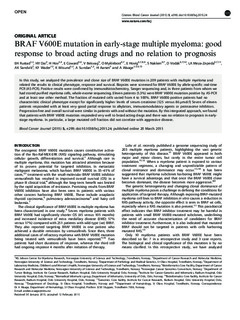BRAF V600E mutation in early-stage multiple myeloma: good response to broad acting drugs and no relation to prognosis
Rustad, Even Holth; Dai, Hong Yan; Hov, Håkon; Coward, Eivind; Beisvag, Vidar; Myklebost, Ola; Hovig, Eivind; Nakken, Sigve; Vodak, Daniel; Meza-Zepeda, Leonardo A.; Sandvik, Arne Kristian; Wader, Karin Fahl; Misund, Kristine; Sundan, Anders; Aarset, Harald; Waage, Anders
Journal article, Peer reviewed
Permanent lenke
http://hdl.handle.net/11250/2357809Utgivelsesdato
2015Metadata
Vis full innførselSamlinger
Sammendrag
In this study, we analyzed the prevalence and clone size of BRAF V600E mutation in 209 patients with multiple myeloma and
related the results to clinical phenotype, response and survival. Biopsies were screened for BRAF V600E by allele-specific real-time
PCR (AS-PCR). Positive results were confirmed by immunohistochemistry, Sanger sequencing and, in three patients from whom we
had stored purified myeloma cells, whole-exome sequencing. Eleven patients (5.3%) were BRAF V600E mutation positive by AS-PCR
and at least one other method. The fraction of mutated cells varied from 4 to 100%. BRAF V600E-positive patients had no
characteristic clinical phenotype except for significantly higher levels of serum creatinine (125 versus 86 μmol/l) Seven of eleven
patients responded with at least very good partial response to alkylators, immunomodulatory agents or proteasome inhibitors.
Progression-free and overall survival were similar in patients with and without the mutation. By this integrated approach, we found
that patients with BRAF V600E mutation responded very well to broad acting drugs and there was no relation to prognosis in earlystage
myeloma. In particular, a large mutated cell fraction did not correlate with aggressive disease.
